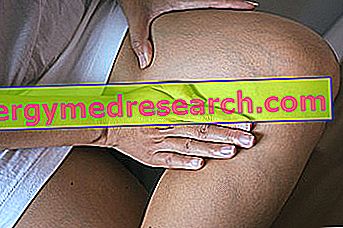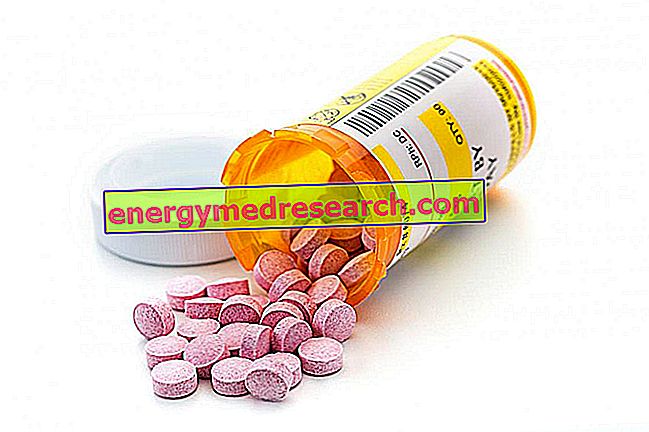Definition
Among the chronic dermatitis we cannot forget the acne rosacea, known to most, simply, as "rosacea": it is a condition characterized by erythema, telangiectasias and pimples at the level of the face, which almost always remains undiagnosed because it is asymptomatic and, in general, much less evident than with acne or dermatitis properly called.
Causes
Rosacea is a pseudo-disease of unknown etiology, which means that a single responsible cause has not yet been identified. However, some experts are completely convinced that damage to blood vessels can greatly affect the manifestation of rosacea; probably, leukocytes and inflammatory elements are also implicated in this condition.
Symptoms
Generally, the most recurrent symptoms associated with rosacea are: acne, reddening of the face (forehead, nose, cheeks), formation of telangiectasias on the face, red eyes, tendency to tearing and blushing, a tingling sensation sometimes associated with itching.
Natural Care
Information on Rosacea - Medications for Acne Rosacea Treatment is not intended to replace the direct relationship between health professional and patient. Always consult your doctor and / or specialist before taking Rosacea - Acne Rosacea Medications.
drugs
While there is unfortunately no specific treatment to treat rosacea definitively, on the other it is good to consider that the disease in question is not serious and does not involve complications. However, rosacea still remains an aesthetic disorder, which scares many people's faces.
Since, as we have seen, the most suitable drugs for the complete cure of the disease have not yet been identified, the following substances are not useful for healing purposes; rather, these treatments are aimed at improving the aesthetic appearance of the person, as well as reducing any inflammation associated with rosacea.
Useful tips to lighten the signs of rosacea:
- do not expose yourself to the sun for too long, especially for work
- do not take spicy and alcoholic foods
- limit physical exercise for prolonged periods (to avoid stress, which can accentuate the problem)
- reduce stress
- makeup can cover imperfections caused by rosacea
- clean the skin with mild detergents
Antibiotics for topical use :
- Metronidazole (eg Rozex cream / skin emulsion, Zidoval cream / gel): the application of topical metronidazole is very effective in the long term, especially to prevent relapses (recurrent forms) of rosacea. In case of severity, it is possible to associate topical metronidazole with an oral treatment.
- Tetracycline (eg Tetrac C, Pensulvit): the drug is an antibiotic to be applied topically, 1-2 times a day. The duration of therapy depends on the patient's response; it can last for 4-6 weeks and, in particularly resistant cases, even 4-8. Do not exceed 8-12 weeks of tetracycline therapy.
- Erythromycin (eg Erythromycin IDI gel / cream, Eryacne gel, Zineryt): in the form of gel or cream, apply the product to the infected area once or twice a day. Thoroughly clean the area before applying the drug.
- Sulfacetamide sodium and sulfur (ex. Sulfac S FN): indicated both for the treatment of acne and for rosacea. Available as a suspension for topical application, solution or foam at different concentrations; in general, the product should be applied to the skin affected by rosacea 1-2 times a day depending on the product considered and the severity of the disorder. It is recommended to massage the formulation after having applied it to the skin, to favor its absorption.
- Azelaic acid (eg. Skinoren, Finacea): the antimicrobial drug (non-antibiotic) should be applied to the skin (15% gel) twice a day, morning and afternoon. The skin must be thoroughly cleaned before applying the product; it is recommended to use mild and not very aggressive detergents, since the skin affected by rosacea is particularly sensitive. Continue treatment for 12 weeks. Do not use in children under 12 years, unless further instructions from the doctor.
Retinoids for topical use : although useful for treating rosacea, retinoids must be used with caution, respecting the doses prescribed by the doctor. These substances, in fact, in contact with the skin can cause more or less intense side effects, such as erythema and peeling of the skin. However, it has been observed that in most patients using retinoids, side effects tend to regress with advancing therapy
- Isotretinoin (eg. Roaccutan, Aisoskin, Isoriac, Isotrex): this drug is used in therapy against severe rosacea, especially with a psychological etiology, not treatable with antibiotic drugs. Isotretinoin is by far the most potent antiacne drug and is also very suitable for the treatment of rosacea and cystic acne. Do not take during pregnancy: the drug has a teratogenic effect, even long after the end of the treatment. The drug should be applied to the skin once or twice a day).
For further information: see the article on drugs for acne treatment.
Corticosteroids : in some cases, when rosacea appears in the eye, it is possible to use corticosteroid drugs, to instill them directly:
- Loteprednolo (eg. Loteprednololo, Lotemax 0.5%): for the treatment of rosacea in the eye, it is recommended to instill 1-2 drops (suspension of 0.5%) in the affected eye (or both), 4 times per day. If rosacea persists, increase the dose to 1-2 drops every hour during the first week of treatment.
Phytotherapy and rosacea
Nature also offers some useful remedies for the treatment of rosacea: in herbal medicine, some products specifically formulated to treat rosacea can be found, such as artichoke, chicory, walnut, rosemary, butcher's broom, vine etc. These drugs act on the microcirculation, increasing the resistance of the capillaries, contrasting their fragility, a typical characteristic of rosacea.



